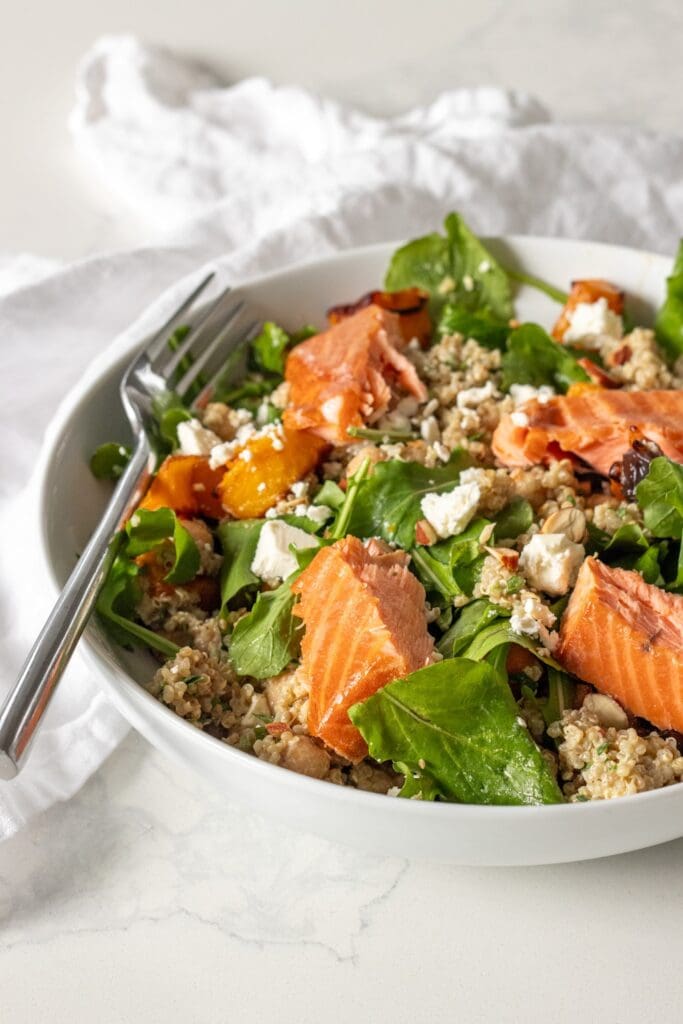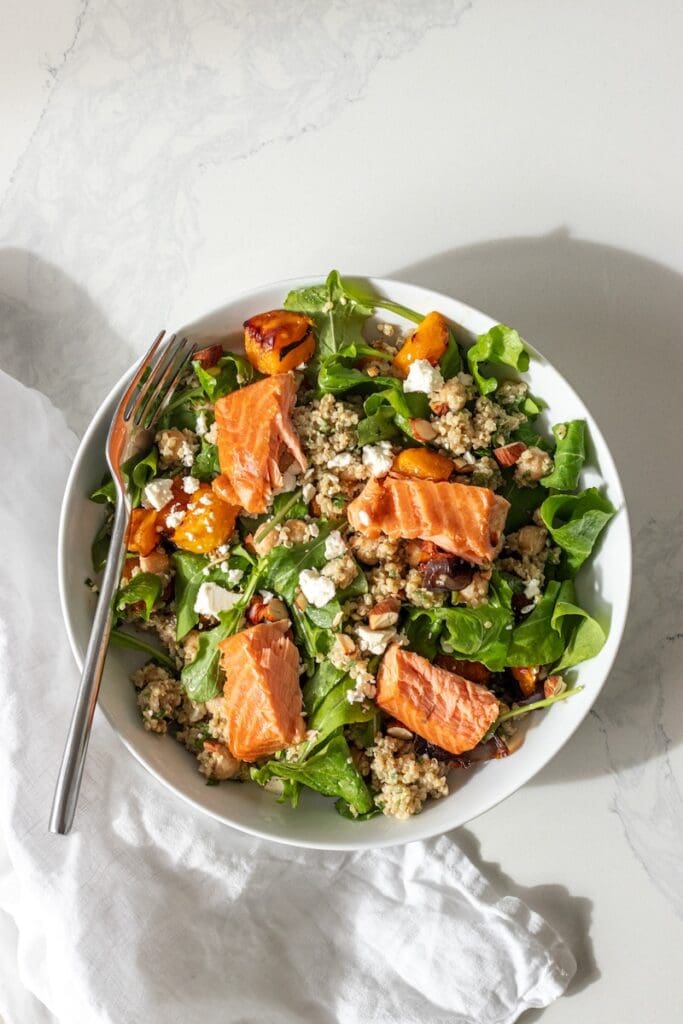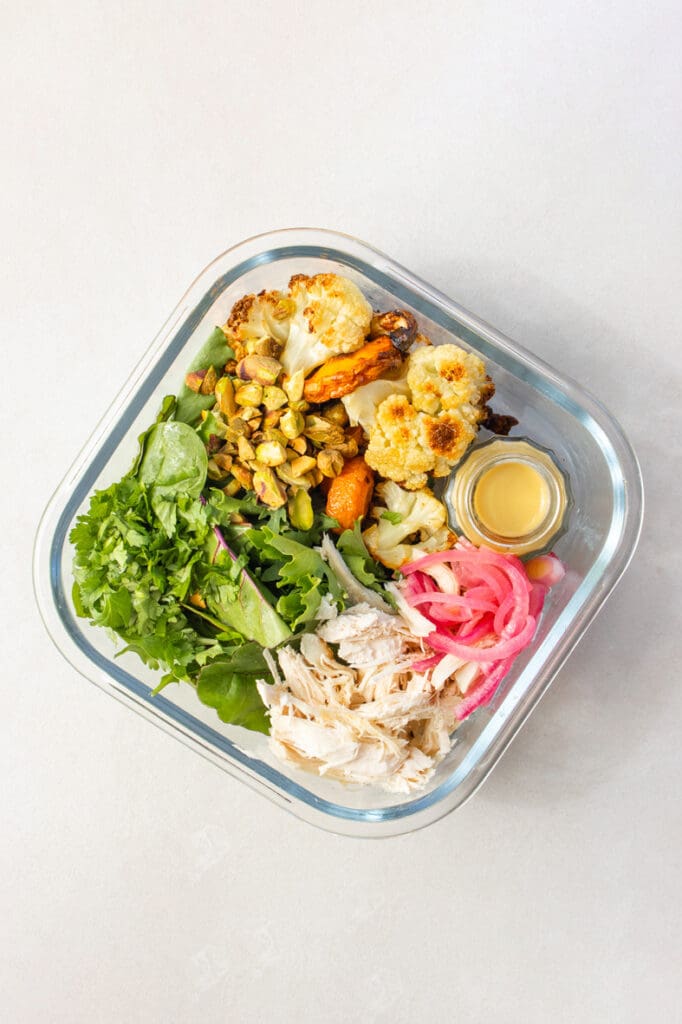By Jessica Giljam-Brown is a qualified nutritionist and medical herbalist
These days women are BUSY, and this means that lunch can sometimes fall by the wayside. I’m sorry to say that a few bites of sushi or another coffee doesn’t count as lunch.
One of the most impactful choices women can make for their overall health is to fuel themselves properly, at all meals of the day. High-protein lunches, in particular, play a crucial role in supporting proper hormonal function and good energy levels.
The Key Rolls and Benefits of Protein
Stabilise blood sugar
A high-protein lunch can help stabilise blood sugar levels throughout the afternoon, which is vital for proper hormone production, and keeping testosterone in check. When you consume a meal rich in protein, it slows the absorption of glucose into the bloodstream, preventing the sharp spikes and crashes associated with high-carb, low-protein meals. This steady blood sugar level helps regulate insulin, a hormone that plays a significant role in glucose metabolism and can influence conditions like polycystic ovary syndrome (PCOS) and diabetes. By including protein in your lunch, you help maintain a more consistent blood sugar level, which can aid in managing hormonal fluctuations.
The building blocks of hormones
Protein is made up of amino acids, which are the building blocks of hormones. For example, tryptophan, an amino acid found in many protein-rich foods, is essential for producing serotonin, a neurotransmitter that affects mood and sleep. Similarly, tyrosine, another amino acid, is crucial for the production of thyroid hormones that regulate metabolism. By ensuring your lunch includes high-quality protein sources, you provide your body with the necessary components to produce and regulate these hormones effectively.
Keeps you fuller for longer
High-protein meals are known for promoting satiety, which means they help you feel full and satisfied for longer periods. This can be particularly beneficial for women who feel the need to snack or need a 3pm ‘pick-me-up’. Feeling satiated can reduce the likelihood of reaching for sugary or processed snacks, which can cause blood sugar fluctuations and, in turn, affect hormone levels.
Keeps the mood in check
Hormonal imbalances can often lead to mood swings, fatigue, and irritability. Consuming a protein-rich lunch can help mitigate these effects by providing a steady source of energy and supporting the production of mood-regulating neurotransmitters and sex hormones like progesterone.
So How Much Protein Do You Need?
It can be tough to know what ‘enough’ protein looks like, so let’s go through it. Traditional guidelines suggest that you need about 0.8g-1g of protein per kilo of body weight, but newer research suggests 1.6-2.2g/kg is optimal (e.g. a 65kg woman would need 1.8g x 74kg = 133g of protein per day). Protein needs increase if you are pregnant, breastfeeding, unwell, exercising heavily or elderly.
There is often confusion around how much protein is in a portion of food; for example, 100g of chicken will provide you with only about 30g of protein; no food is 100 per cent protein.
It is important to note that most foods, even green leafy vegetables, contain at least some protein. Meat contains 25–30 per cent protein, eggs 12 per cent, nuts and seeds contain between 15 and 25 per cent, and grains, beans and lentils are between 8 and 20 per cent.
Aim for 25-35g of protein at each main meals, and another 10g for your afternoon snack – this will help ensure you are supporting your health and hormones. If you are unsure about what your protein needs look like then please reach out for some help.
Some Lunch Recipes to Get You Started
Incorporating high-protein foods into your lunch doesn’t have to be complicated. Opt for lean proteins like chicken, turkey, tofu, or legumes – combine these with whole grains, vegetables, and healthy fats to create a balanced meal that supports both hormonal health and overall well-being.
Did you know our recipes are crafted from whole food ingredients? That means we steer clear of pre-made condiments, which are often loaded with additives and seed oils that can wreak havoc on your health. Instead, we show you how easy it is to make your own, and for a fraction of the cost. Click here to start your 7-day free trial!
About Jessica
Jessica Giljam-Brown is a qualified nutritionist and medical herbalist with over 10 years experience in helping women feel their best. She specialises in women’s health, hormonal disorders, fertility, pregnancy, and beyond. For more information about Jessica visit wellnessbyjessica.com or follow her at @wellnessbyjessica on Instagram.
For easy and practical advice around how to choose the right foods for you, check out my Eat to Thrive Webinar use the code ASSORTMENT for 10% off.









